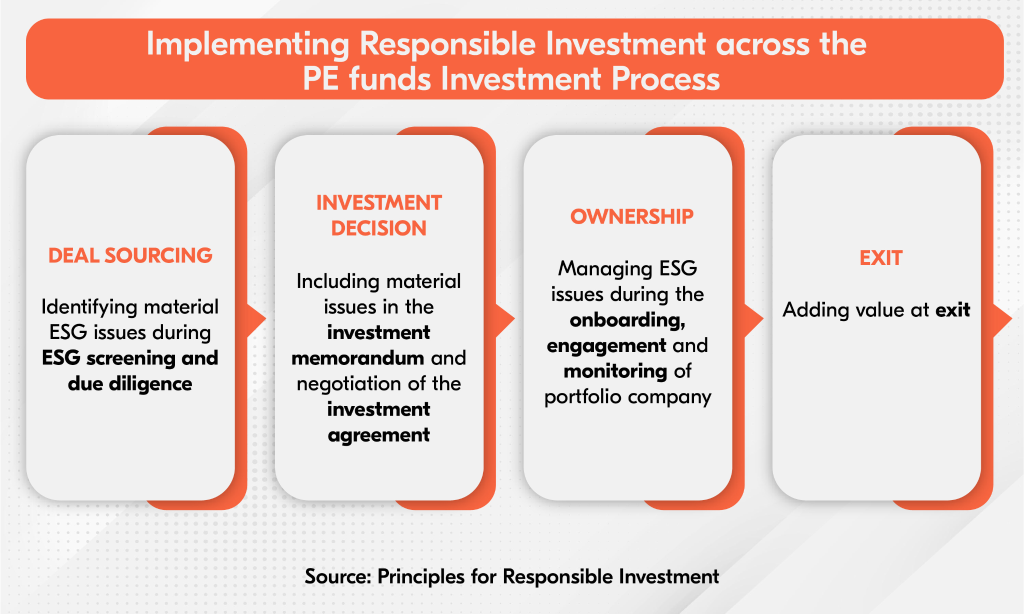The fast-growing relationship between ESG and PE Funds
DISCLAIMER: This post was last modified on 16 February 2023. Some information in this article may not be updated.
Private equity (PE) funds continue to be an attractive investment vehicle for institutional clients and high-income and high-net-worth individuals. At the same time, the demand for addressing environmental, social and governance (ESG) issues is in the spotlight, which continues to shape the conduct of the financial industry and of the market participants.
It did not take long for the integration of ESG to be considered as an investment or even a corporate-wide imperative. Following this, PE funds have consequently faced regulatory scrutiny in the last few years, especially with the increasing demand for addressing ESG issues in these investments.
ESG in PE Funds – when did it start?
The official relationship between PE funds and ESG can be argued to have started in 2009. At that time, the United States Private Equity Council (PEC) adopted a set of “responsible investment guidelines” developed “by investors, for investors” covering several areas such as environmental, health, safety, labour, governance and social issues. At that time, however, the focus was on excluding companies, stocks or entire industries from investment portfolios through negative screening. Ethical investing progressively evolved into the integration of ESG factors into investment strategies.
These investment guidelines urged the asset class to integrate ESG into the ownership activities and investment decisions of PE investors. Then Principles for Responsible Investment (PRI) Executive Director James Gifford claimed that “[The] announcement by the PEC that its members have adopted these comprehensive guidelines on responsible investment marks a major step forward in our efforts to elevate ESG issues at all companies, public and private.”
Investor demand for ESG
A 2020 survey report by the INSEAD’s Global Private Equity Initiative (GPEI) revealed that 89 per cent of surveyed limited partners (LPs) expressed agreement with the existing role of ESG criteria in their investment decisions. Moreover, 77 per cent of the LPs surveyed claimed that they are already screening PE fund managers with the use of ESG criteria.
Efforts to accommodate these are underway. In the same report, it was found that across the top 50 global PE funds, 64 per cent reported using PRI’s and the United Nations’ Sustainable Development Goals (SDG) to incorporate ESG into their investment procedures. In another survey performed by KEY ESG with over 100 industry participants, an increasing number of funds, currently 40 per cent, are using ESG credentials and screening to characterise themselves and attract capital from ESG-conscious investors.
The boost of ESG standards and frameworks
The standards and frameworks concerning ESG in the financial markets have substantially increased over the years. Accordingly, the adoption of ESG voluntary standards and frameworks has been well received by investors.
Along with this, legislative initiatives have been aimed at regulating ESG aspects in the financial sector and its products, seeking to provide clarity and avoid greenwashing. The EU Taxonomy Regulation and Sustainable Finance Disclosure Regulation (SFDR) are considered to represent the European Union’s (EU) most transformative ESG-focused regulation within the financial markets. Add to this is the recently adopted Corporate Sustainability Reporting Directive (CSRD), which will require all large businesses in the EU to report on their non-financial performance and will also touch on aspects required by the other frameworks (e.g., EU taxonomy and SFDR).
The PRI developed six actionable standards, called “the Principles,” for incorporating ESG matters into investment processes. Now that investment priorities and focus have changed and it is no longer enough to simply “tick the box,” the PRI outlines a guide that will facilitate the implementation of responsible investment across the PE investment process.

As shown in the diagram above, PRI integrated several strategies and practices that guide investors to incorporate ESG factors into their investment decisions and enable active ownership. For instance, ESG-related issues can already be pinpointed as early as the deal sourcing stage with the following practices:
- Screening. PE firms can use ESG criteria in the form of ESG risks or an exclusion list of controversial industries to screen investment deals.
- General partner (GP) and Limited partner (LP) screening. With this, GPs and/or LPs set screening criteria that will be agreed upon during a fund’s formation.
- Due diligence. Significant ESG issues identified will then be investigated, which will serve as a basis for the approach to ESG management during the investment’s holding period. The said approaches will typically include questionnaires to identify ESG policies in place and review ESG-related legal requirements, to name a few.
Facing the challenges ahead
Despite the significant demand and developments within PE funds and ESG, fund managers and investors are still facing challenges, specifically in knowing what data to gather, measure and report, and how to report it.
In the abovementioned KEY ESG survey, it was found that 90 per cent of portfolio companies claim to be unsure of how to report on ESG data. Moreover, it was also found that the lead time in collecting ESG data for many firms takes up to twelve weeks, which leads to potential missed deadlines and barriers to the prompt accomplishment of investment deals. In the USA, it was discovered that 75 per cent of GPs are unsure of which European-based fund regulations apply to them and by when.
On another note, PE managers may also risk “greenwashing” or their ESG efforts and measures being seen as superficial with unclear direction as to how ESG strategies are executed.
Looking ahead, there is still much work to be done to effectively incorporate and implement ESG aspects into PE funds and even in other asset portfolios.
Existing regulations may not be applicable to every PE manager’s case, but understanding and keeping up to date with new implementations and regulations is a compliance exercise and a way to anticipate future regulations. Certainly, the regulatory landscape of tomorrow will hardly be recognizable from that of today. For information about the outlook and trends for ESG this 2023, read this blog.
Bolder Group as your partner
Working with a professional partner that can develop a suitable external framework for identifying strategic areas for growth and taking assertive steps can drive your ESG priorities forward.
Bolder Group ensures that its clients are on top of the highly demanding ESG landscape. PE fund managers and other private market participants can be aligned with the fast-developing frameworks and standards to ensure a sustainable investment approach and corporate success.
With our professional services, industry players can effectively identify and build upon their initiatives towards ESG value creation and compliance.
Bolder can offer tailored services to our clients’ needs and preferences with our ESG specialists and partners. Get in touch with us to administer your PE funds and ESG needs.
Bolder Group does not provide financial, tax or legal advice and the information contained herein is meant for general information purposes only. We strongly recommend that before acting on any of the information contained herein, readers should consult with their professional advisers. The Bolder Group accepts no liability for any errors or omissions in the information, or the consequences resulting from any action taken by a reader based on the information provided herein.
Bolder Group refers to the global network of independent subsidiaries of Bolder Group Holding BV. Bolder Group Holding BV provides no client services. Such services are provided solely by the independent companies within the Bolder Group which are each legally distinct and separate entities and have no authority (actual, apparent, implied or otherwise) to obligate or bind Bolder Group Holding BV in any manner whatsoever. The operations of the Bolder Group are conducted independently and have no affiliation with third party financial, tax or legal advisory firms or corporations.
